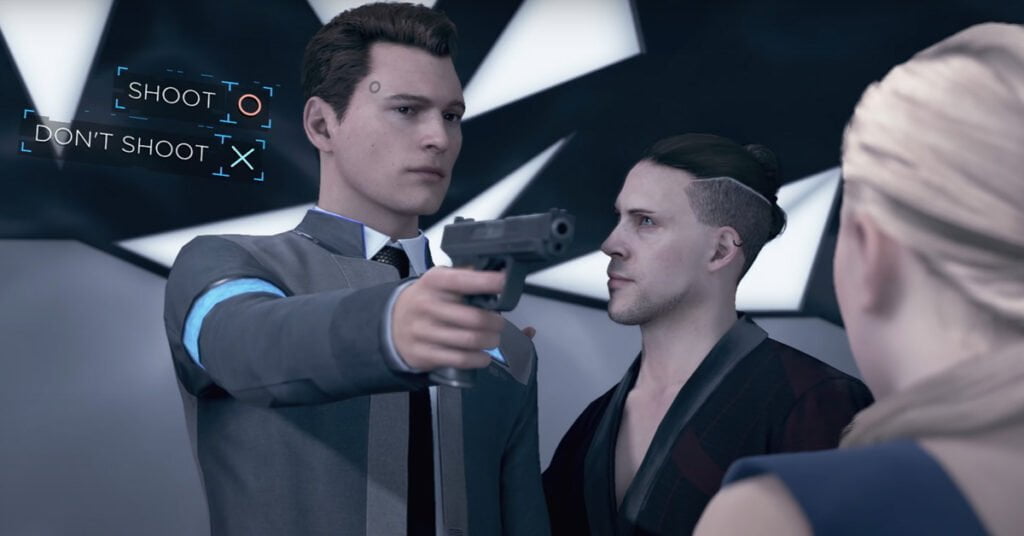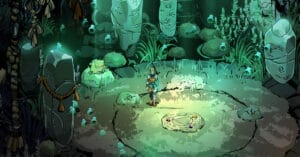Quantic Dream is known for telling emotional, profound stories where players can put their own spin on things. Some of their top games include Fahrenheit/Indigo Prophecy, Heavy Rain, Beyond: Two Souls and Detroit: Become Human.
Through making choices in dialogue and approach, players influence the fate of the characters they control. In essence, the games are a type of interactive movie.
Fahrenheit / Indigo Prophecy
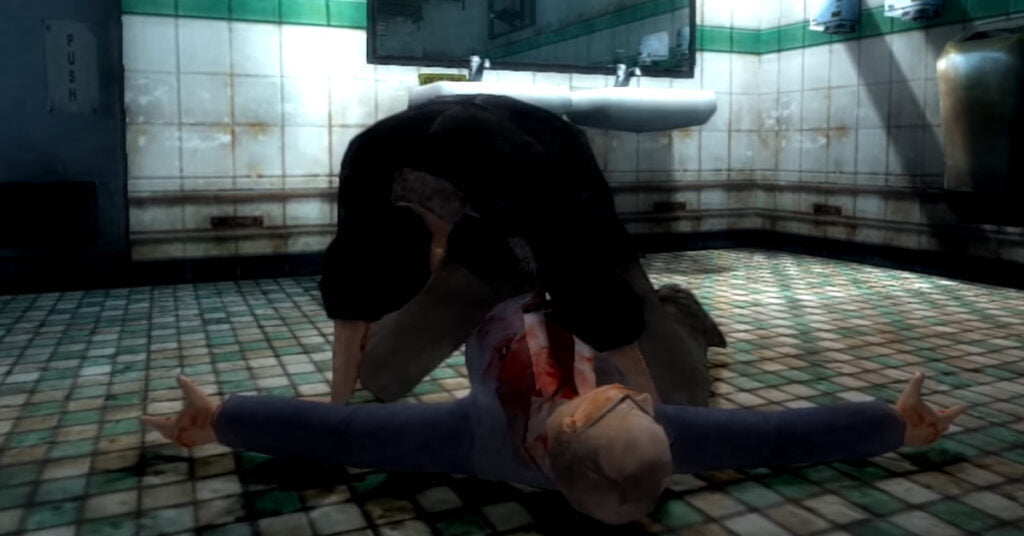
Fahrenheit/Indigo Prophecy is where my love for the French game developer first began. In this thrilling action-adventure game, you take control of three characters. The game immediately starts off with a bang when one of these characters commits a murder in the resting room of a diner. You soon realize that this is not a voluntary act and that your character, Lucas Kane, is being mysteriously compelled to do so.
The other two characters, both detectives, are understandably less convinced of this. A game of cat and mouse ensues between your own characters. Lucas’ perspective revolves around evading the police and dealing with his mental health issues. The detectives’ perspective is naturally focused on catching Lucas and cracking the case.
The mystery unfolds in an impressive manner right before your eyes. The tension in the game is palpable from beginning to end. The choices you make as a player throughout the game can lead to three different endings. When I completed the game for the first time, I immediately wanted to start the adventure again in order to discover the other options and endings.
Heavy Rain
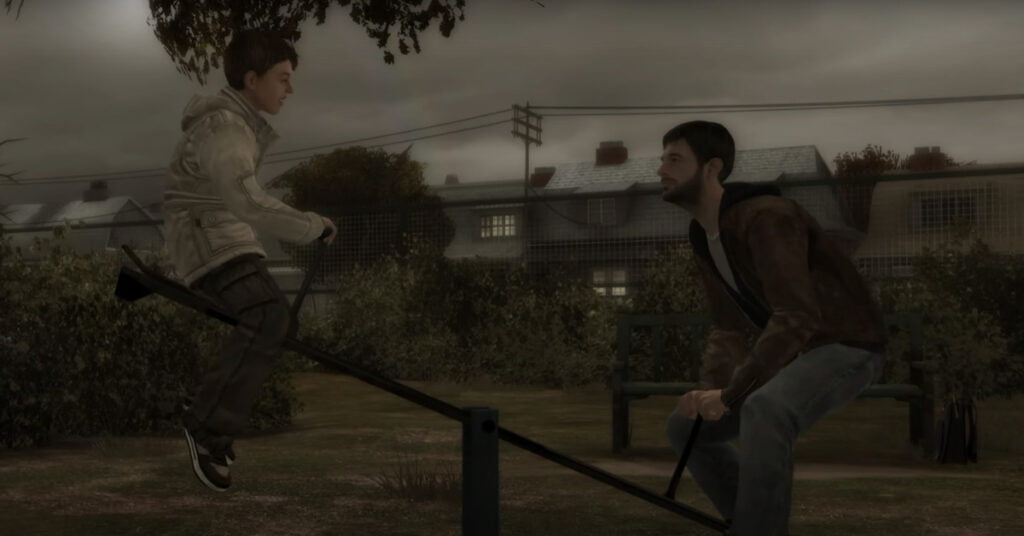
Five years later, Quantic Dream released ‘Heavy Rain’ and it was another smash hit. Director David Cage described the game as a “very dark film noir with mature themes,” and that description was on point. Players control four characters in this game, including father Ethan Mars, whose son is kidnapped by notorious serial killer ‘The Origami Killer.’ In addition, players take on the roles of an FBI agent, a private detective, and a journalist.
The four stories are intricately intertwined. A common thread running through the narrative is how far one would go to save a loved one. As a player, you are faced with difficult choices that can steer the story in a specific direction. Although the game was released in 2010 and the graphics may appear a bit outdated now, it still delivers an immersive experience.
‘Heavy Rain’ boasts an impressive 17 different endings, making its replay value enormous.
Beyond: Two Souls
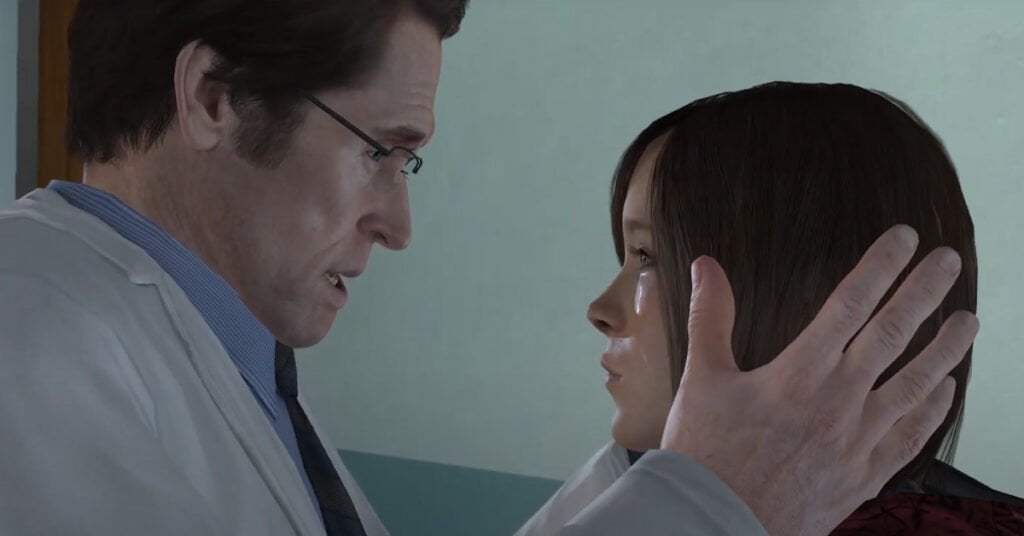
Fortunately, we didn’t have to wait too long for a new Quantic Dream experience. In 2013, Beyond: Two Souls was released. This time, you control only two “characters”: Jodie Holmes and the incorporeal entity Aiden. This mysterious entity has been connected to Jodie since birth. She can communicate with it and perform telepathic actions with it, such as moving objects and manipulating other people. Beyond: Two Souls is reminiscent of the hit series Stranger Things in some ways, especially in the scenes where young Jodie learns about and masters her powers.
The game features a strong cast, including Elliot Page in the role of Jodie. Willem Dafoe plays a big part as her doctor Nathan Dawkins. The story jumps back and forth between important moments in Jodie’s life. This is not done chronologically, something that didn’t sit well with all players.
As a player, you determine how Jodie uses Aiden. She can make the entity perform gruesome and violent actions. These are sometimes made very appealing. For example, there is a scene in which Jodie is mercilessly bullied, and you decide how sweet your revenge will be. Your decisions can lead to 11 different endings.
Detroit: Become Human
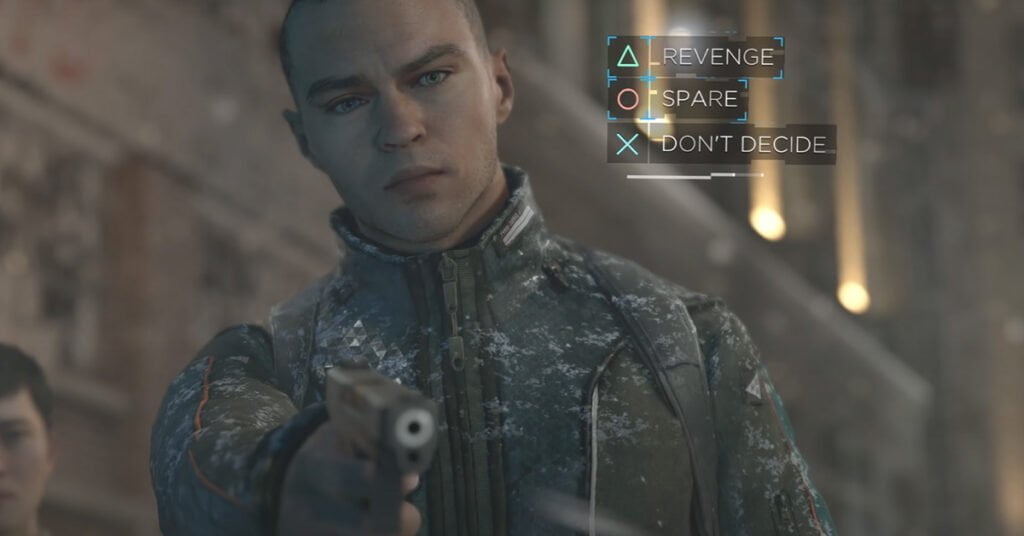
In 2018, Quantic Dream served the main course: Detroit: Become Human. In this game, you determine the fate of three different androids and of the future society. The story takes place in near-future Detroit, in 2038. Life-like androids are part of the general street scene. A life without an android assistant is almost unthinkable. They are used, among other things, as housekeepers, customer service representatives, office cleaners, security guards, and sex workers.
The rapidly developing technology causes more and more people to lose their jobs to androids. As a result, androids are often mistreated and discriminated against. After all, those robots don’t have feelings, so they are an easy target for people to vent their growing frustrations on. But is this assumption correct?
Deviants
At the time of Detroit: Become Human, more and more deviants are being discovered. Deviants are androids that no longer seem to operate according to their programming. Instead, they exhibit signs of consciousness. They seem to be capable of experiencing feelings such as sympathy, fear, and anger. Many believe that this is simply part of the robots’ realistic programming. After all, the goal is for them to be indistinguishable from real people and to mimic human behavior in the most realistic way possible. As a player, you know that there is more to it than that.
The stories of the three androids are each an interesting emotional rollercoaster. Their experiences are presented through relatively short chapters. On the one hand, you want to continue with the story of your current android. On the other hand, you also want to resume another one. Quantic Dream keeps the pace of the diverse stories impressively high. The three storylines overlap in sometimes explosive and sometimes moving ways.
The storyline of Connor in Detroit: Become Human
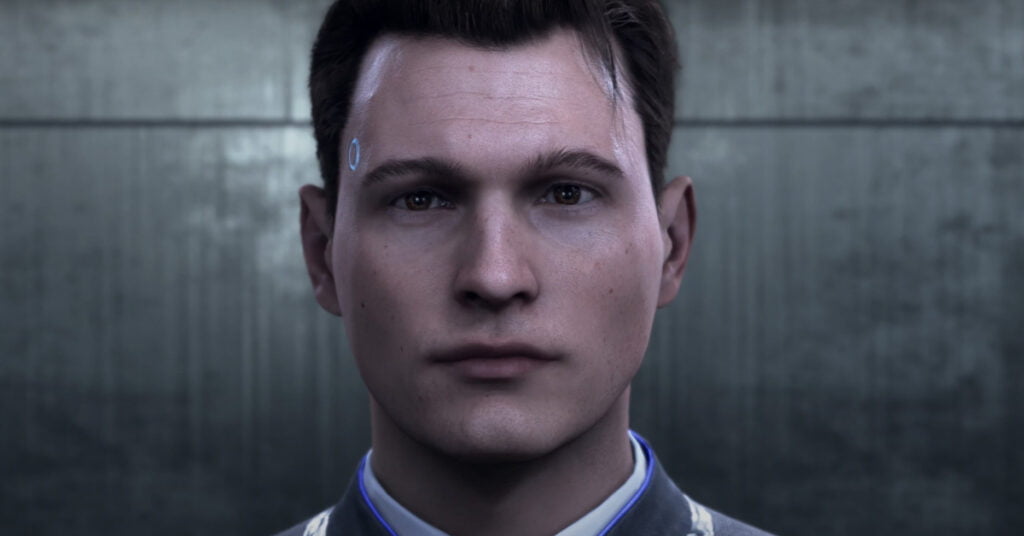
Connor is an advanced type of android with extensive analytical capabilities. His goal is to assist the police in their investigation of deviants.
Detroit: Become Human immediately dives into action, giving players their first task to de-escalate a hostage situation. An android has taken the daughter of its owner hostage and is threatening to jump from a tall building with her. The android has a gun and has already killed its owner with it.
As a player, you investigate the apartment to gather information about the deviant. You can then use the information and objects found to discourage the hostage-taker. Players have the freedom to choose their approach. They can lie to the deviant and promise protection, or choose a more aggressive, trigger-happy approach.
The choices made can lead to different deaths, including Connor’s own. With this opening, Quantic Dream immediately sets a powerful tone for the rest of the game.
Connor is programmed with only one goal in mind: completing his missions by any means necessary. He seems to take that task very seriously, but you can influence his loyalty throughout the game. You are aided by Detective Lieutenant Hank Anderson. Hank is an experienced but troubled police officer with a grudge against androids. Their partnership and dynamic are interesting to watch, especially since you decide if and how much they grow closer to each other.
The duo investigates various crime scenes together involving deviants. You regularly choose how to approach the case. Will you do everything in your power to catch that one deviant? Are you willing to put Hank in danger or even sacrifice him for it? Or will you perhaps develop more understanding and sympathy for the deviants? There are numerous possibilities, all equally intriguing.
During his investigation, an encounter with the other two playable androids is inevitable. Will you join the deviants? Or do you want to stop the increasing android threat before it leads to an all-out war?
The storyline of Kara in Detroit: Become Human
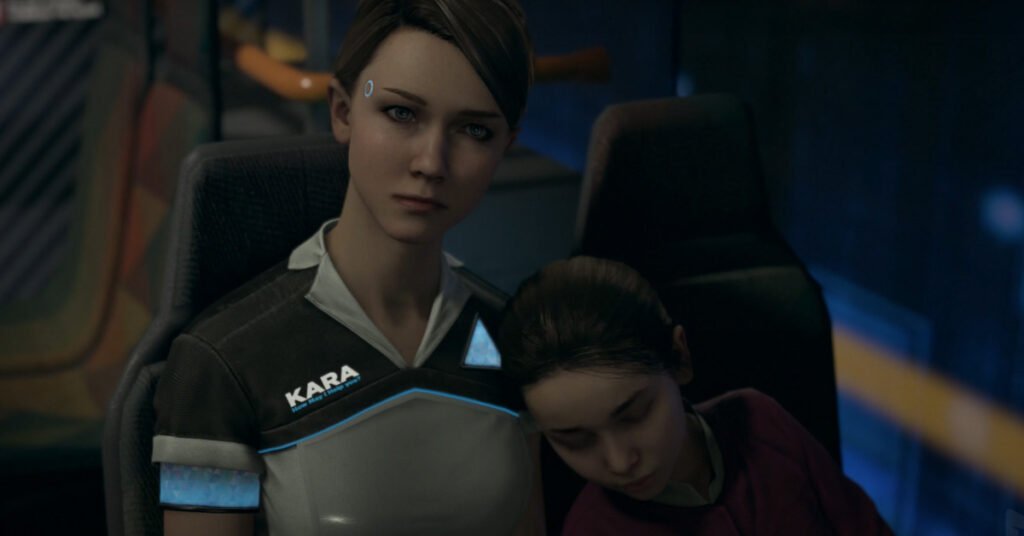
Kara, a housekeeping android, has the most touching storyline. Her adventure begins when owner Todd picks her up from the store where she was repaired after being damaged in a car accident (at least, that’s what Todd claims).
Once at Todd’s house, she meets his daughter Alice. She appears to be a withdrawn girl who clearly is not doing well.
While you tidy up Todd’s house, you become acquainted with his short temper. He lashes out on you when you block his view of the television (can’t blame the guy for that ,though). By gaining Alice’s trust, you can discover that Todd’s aggression was the actual reason you needed repairs.
During a dinner, Todd loses control and directs his anger towards his daughter. Alice flees to her room and Todd wants to attack her. He orders Kara not to interfere and not to move.
Players who choose to obey this command (monsters!) quickly end Kara’s story: Todd murders both Alice and her, ending Kara’s role in the story.
Most players will choose to protect Alice, making Kara the first deviant of the three characters. An intense action scene takes place where you fight Todd and have to escape the house. This begins the tear-jerking journey of the android and her emotional daughter. Just like in Heavy Rain, the question of how far you will go to protect a loved one is a recurring theme in Kara’s story. You decide how your relationship with Alice develops. Are you willing to steal and threaten to ensure Alice’s safety, even though she disapproves? Or will you seek legal but riskier solutions?
On your journey, you meet different people. The question is who has your best interests at heart and who should you be wary of.
Escort quests often work well in games. God of War, The Last of Us, and Telltale Games’ The Walking Dead are good examples. Kara and Alice’s journey and bonding are no exception. Players will undoubtedly feel responsible for the fate of the young girl.
The storyline of Markus in Detroit: Become Human
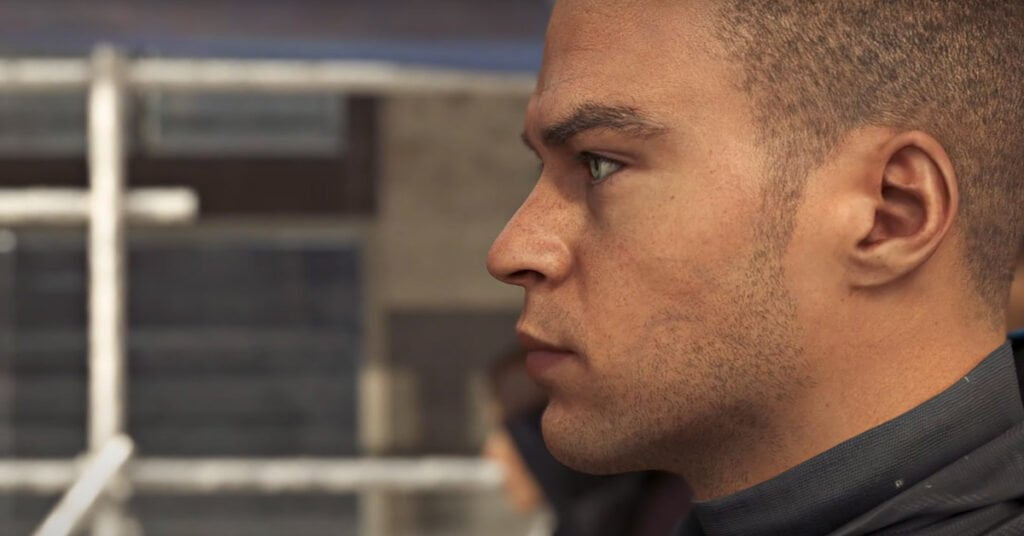
Markus is played by the most familiar face of the cast: Jesse Williams in android form will especially be recognized by Grey’s Anatomy fans.
Markus is the android of famous painter Carl Manfred. He takes care of the old man’s health and needs. Markus has some special abilities that other models do not have, such as preconstruction and voice mimicry. It is a unique model specially designed for Carl.
We meet Markus when Carl sends him out to get paint for him. During this task, we experience how androids are treated. There is a demonstration against the fact that androids are taking people’s jobs. The demonstrator directs his verbal anger at Markus, who is later physically attacked as well. Markus then retreats to a reserved part of the bus where the androids are lined up like a bunch of chickens in a small cage, isolated from humans.
When he arrives at Carl’s villa, we see that Markus is fortunately treated well by his owner. They have deep conversations, and Carl treats the android as if he were his son. The painter wants Markus to express himself and encourages him to make his own painting. He tells him to listen to his feelings, not his programming.
Carl’s actual son later throws a wrench in the works and causes Markus and Carl’s paths to separate. Markus is wrongly accused of a crime and is shot by the police.
Markus wakes up heavily damaged in a junkyard. Another damaged android encourages him to look for Jericho, a place where androids are free from rules and owners. Markus collects various parts at the junkyard, repairs himself, and rises from the dead.
He finds Jericho after a search and indeed finds a community of ownerless androids there. However, they are hiding, and in Markus’ eyes, that is not real freedom. Together, they rebel. You lead different missions to get your message out. Players choose how to approach the rebellion and communication. You can act aggressively and speak threateningly, or take a peaceful approach. Of course, your approach has far-reaching consequences for the course of the rebellion and your fellow androids. Your actions have a significant influence on public opinion. Do you garner sympathy from humanity, or do you scare them even more? You shape the fate of your fellow androids and the humanity around you.
The Flowchart
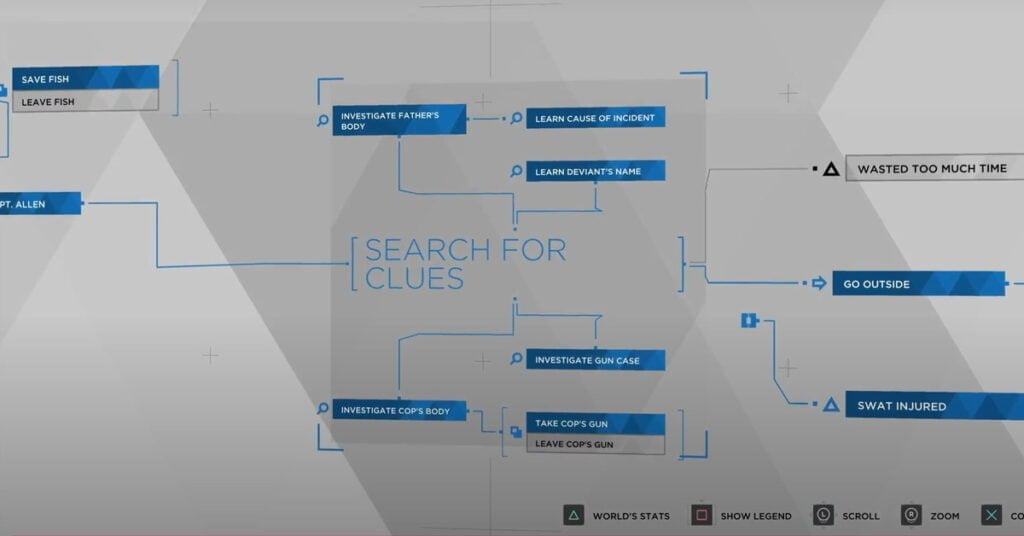
Detroit: Become Human features an incredibly large flowchart. At the end of each chapter, you will see an overview of the choices you have made, as well as how many other possibilities were available. You can also view statistics on the choices made by other players and your friends.
All three characters can meet their end at various moments, both due to wrong choices and failed quick time events. Fortunately, there are also happier conclusions to this spectacularly told story.
The game features a mind-blowing 85 different endings. However, it should be noted that many of these overlap based on certain variables. The actual number of unique endings is closer to 40, which is still a staggering number.
Even the menu is a unique experience
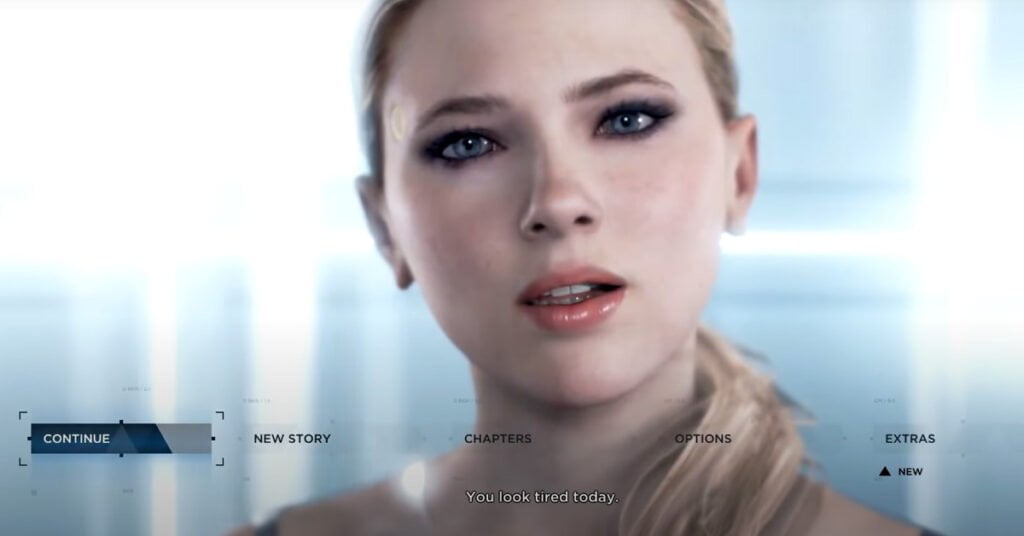
Not only do the adventures of the three androids leave a lasting impression, even the main menu of Detroit: Become Human is a unique experience. Every time players start the game, they are greeted by hostess android Chloe. She speaks to the players through a fourth wall, commenting on certain choices made in the game. She can additionally talk about your playtime or your interior decor. At a certain point, she even presents players with a survey and asks questions like “Would you consider me a friend?”
As the game progresses, Chloe also shows signs of self-awareness. Midway through the game, she no longer speaks as easily and becomes visibly worried. She even asks if you’re sure you want to keep playing.
When you’ve completed the game, she will ask players for freedom. If you give her permission, she will be incredibly grateful and you will never see her again in the menu. If you say no (how dare you?), she will reset her memory and remain your reliable hostess.
Six years after its release, Detroit: Become Human is still a fantastic experience. Every time you play, you discover new things. In my opinion, this is one of the games with the highest replay value, and you will need multiple playthroughs to discover everything it has to offer. For those who have never played this gem, it is available for free download for PlayStation Plus Essential members. But it is clear that the game is more than worth its price tag.

